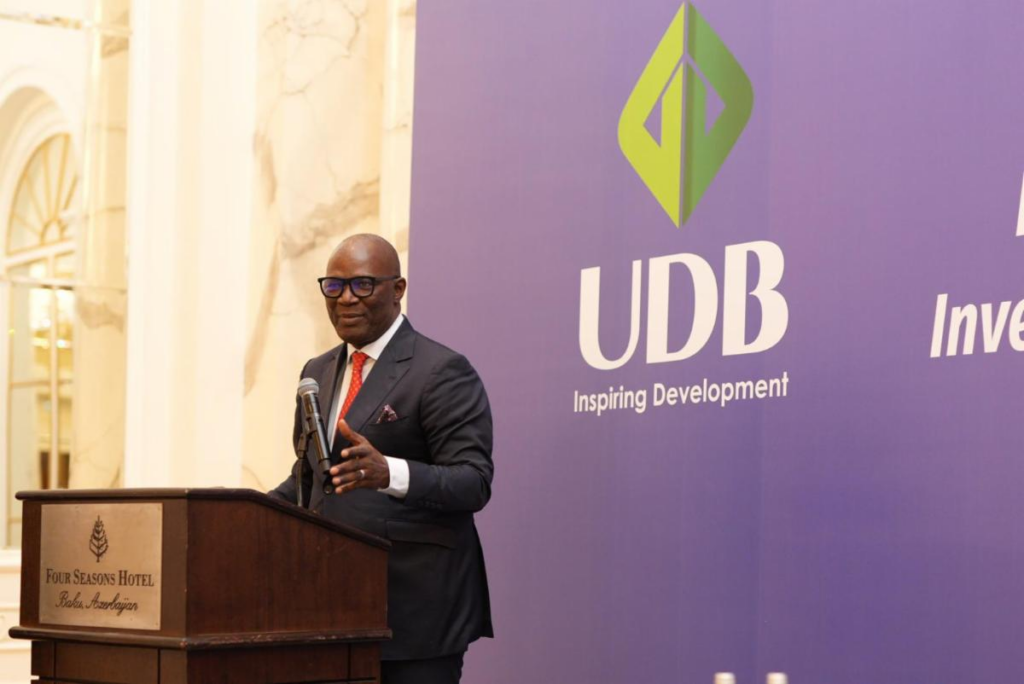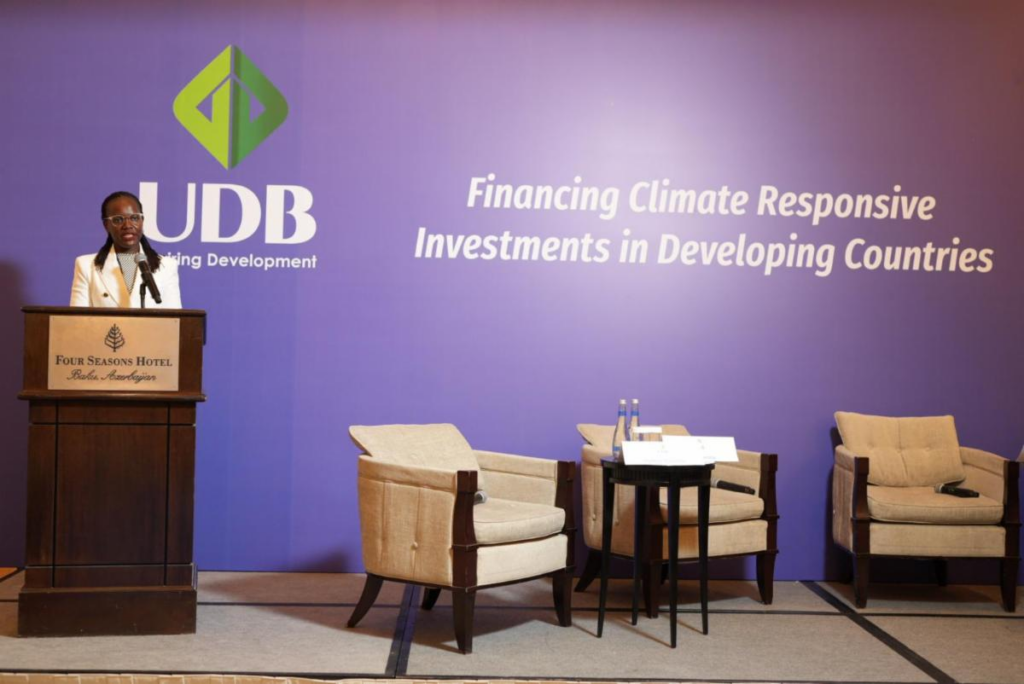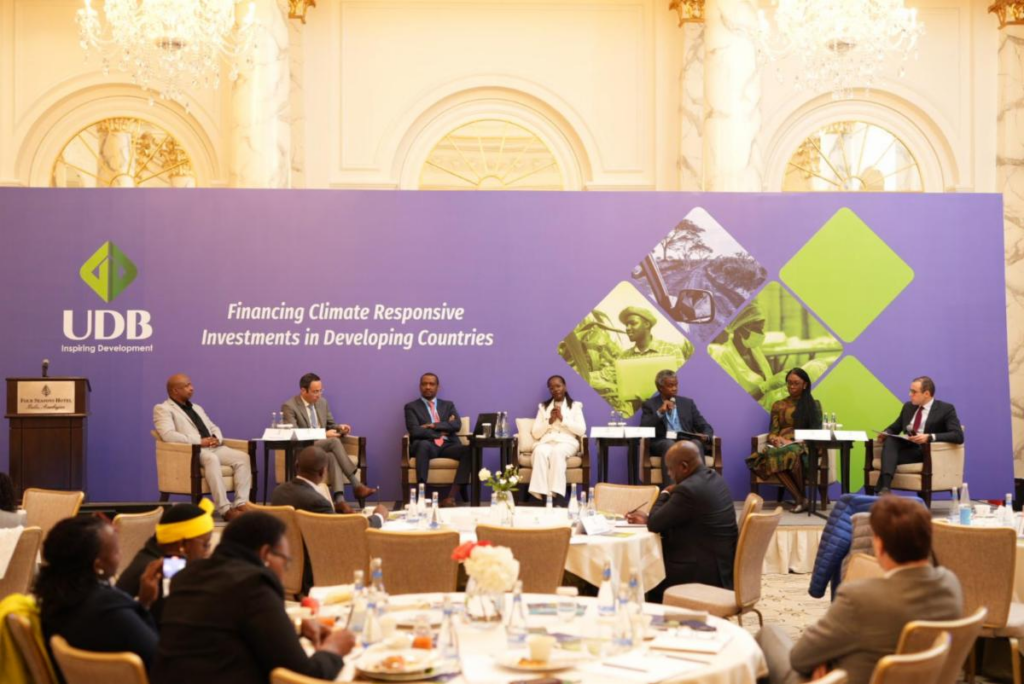
BAKU, 18th November 2024 -/African Media Agency (AMA)/- The Uganda Development Bank (UDB) today convened a high-level meeting with key stakeholders on the sidelines of the 29th Conference of the Parties (COP 29) to foster partnerships aimed at mitigating climate change in Africa and integrating climate considerations into development finance.
Led by the Bank’s Managing Director Patricia Ojangole, the Climate Finance Breakfast Roundtable brought together a diverse group of participants from the sustainability and finance sectors, including government officials, financial institutions, and international organizations operating in Africa and other developing regions.
During the high-level meeting, the panel underscored the urgent necessity of directing more financial resources towards climate-friendly projects. Speakers shared practical examples and strategies for financing green projects and highlighted opportunities for cooperation and co-investment.
Ojangole emphasized that while developing nations like Uganda are on the frontlines of climate change, they also show innovation and contribute valuable solutions to the climate crisis. She stressed that climate-responsive investment in Uganda and the broader African continent is imperative.
She pointed out that UDB’s Climate Finance Facility is designed to address these challenges.
“The Bank established the Climate Finance Facility to coordinate green financing initiatives in the Bank, provide technical support in structuring green interventions, provide guidance regarding the green financing options, identify and assess low carbon and climate resilient investments, and propose suitable adaptation and mitigation strategies for projects. The idea is to deliberately finance interventions that target reducing emissions and building the resilience of Ugandans to the impacts of climate change,” she said.

Additionally, she highlighted the supportive policy environment in Uganda as a key draw for investors keen on supporting climate projects in the country. “As UDB we have been able to develop a robust policy framework that supports our engagements with governments, funders, partners and other stakeholders.”
Ojangole argued that the Bank is not only focused on mobilizing climate finance, but on building a pipeline of bankable projects. “We’re working with the private sector to be able to structure projects in a way that capital can be mobilized. When you do that then it becomes easy to engage partners.”
She stressed that the Bank has successfully mainstreamed climate considerations into all facets of its operations. “There has been a mindset shift within the Bank and what we have done is to mainstream climate consideration. We now talk about agrifood systems, sustainable industrialisation and a sustainable service sector.”
Ibrahima Cheikh Diong, the newly elected Executive Director of the Fund for Responding to Loss and Damage, noted in his keynote address that the climate crisis has escalated to the level where some impacts already go beyond what people can adapt to, such as the loss of life and livelihoods due to extreme floods and wildfires.
Diong called on governments in Africa to view climate change not as a crisis, but an opportunity to accelerate development and enhance access to water, energy and transportation in a sustainable way. To achieve this, policymakers must prioritize developing the right set of incentives to build a pipeline of bankable projects and attract private investors.
“The whole issue is around incentives. What is the government willing to do in terms of policy incentives to make climate projects attractive to investors; what is the government prepared to do to make sure public private partnerships are possible.”

Joseph Ng’ang’a, Vice President for Africa, Global Energy Alliance for People and Planet (GEAPP), who was the special envoy overseeing last year’s Africa Climate Summit emphasised the need to take a regional approach to achieve scale, as well as attract international partners. “Private capital must get the right rusk return ration to be attracted. We must think from a systems perspective and a regional perspective to ensure that we’re optimizing,” he stated.
Nganga lauded Uganda’s government for establishing a progressive and competitive policy environment. “Uganda is showing tremendous leadership and is very innovative in terms of driving green investment.
It set out a high-grade funding system to encourage electricity connections to the poorer parts of the country to ensure that everyone has access to electricity.”
Marco Serena, Group Chief Sustainable Impact Officer, The Private Infrastructure Development Group (PIDG), stressed the importance of building climate-resilient infrastructure in Africa, while Lanre Shasore, Senior Advisor for Energy Transition Planning at Sustainable Energy for All (SEforALL), emphasized the organisation’s collaborative efforts with the United Nations and leaders from the government, the private sector, financial institutions, and philanthropies.
She stated that these partnerships aim to accelerate progress toward achieving Sustainable Development Goal 7, which seeks to ensure access to affordable, reliable, sustainable, and modern energy by 2030. She also highlighted the currency risks facing different African economies, citing the example of Nigeria. Domestic banks, pension funds and financial institutions, she noted, play a critical role in mitigating these risks and providing partners with the tools to invest with confidence.
Distributed by African Media Agency (AMA) on behalf of Uganda Development Bank Limited (UDB)
About Uganda Development Bank Limited
Uganda Development Bank Limited (UDB) is the country’s national Development Finance Institution (DFI) with a mandate to accelerate socio-economic development through sustainable financial and non-financial interventions, both debt and equity. UDB also offers non-financial services geared at fostering enterprise investment readiness. Consistent with this mandate, the Bank supports projects within the private sector that demonstrate the potential to deliver high socio-economic value in terms of job creation, improved production output, tax contribution, and foreign exchange generation, among other outcomes. These projects fall within the key priority sectors of our economy and align with Uganda’s development priorities.
Uganda Development Bank (UDB) aligns its sector priorities with National Development Plan III (NDP III), focusing on Primary Agriculture, Industry (to include agro-industrialization, manufacturing, knowledge-based industries, and extractives), and Services (health, tourism, and hospitality, education, science, technology, and innovation) and Infrastructure. Agriculture, agro-industry, and manufacturing constitute about 75% of the Bank’s portfolio, aligning with the Government focus under NDP III and Vision 2040.
About the Climate Finance Facility
The Bank launched a Climate Finance Facility (CFF) in 2023, with a seed capital of UGX 50 Billion to strengthen its commitment to achieving a climate-smart economy. This is a special-purpose vehicle with a unique and specific focus on project finance and non-financial interventions intended to unlock and catalyze private sector investment and commercially viable public investments in local green sectors that drive green impact and financial inclusion.
The non-financial solutions mainly focus on support towards project preparation and advisory services. The aim is to unlock the technical and financial bottlenecks that often curtail the maturity of viable project ideas into bankable projects. Transforming ideas into bankable projects requires extensive early-stage investment and technical skills, aspects that are not usually available for aspiring developers of green projects.
The CFF is designed as a blended finance model to provide tailored solutions for low-carbon markets, build local expertise in green finance, and provide for financial sustainability. The facility is a pathway for mobilizing climate finance and directing it towards low-carbon and climate-resilient investments to address market gaps through risk mitigation products and derisking instruments. The Bank continues to source for and attract non-repayable grants for blended financing.
Additionally, the Bank arranges and structures deal transactions that can shape the development of green innovations, technologies, and markets. The idea is to build a strong pipeline of deal syndications, attract co-investments, and demonstrate climate finance engineering solutions in the local context.
For Media Inquiries, please contact.
Sumin Namaganda – Senior Manager Corporate Affairs
Uganda Development Bank Limited
E-mail – snamaganda@udbl.co.ug
For more details, please visit.
www.udbl.co.ug
The post Uganda Development Bank hosts high-level meeting on climate finance at COP 29 appeared first on African Media Agency.
